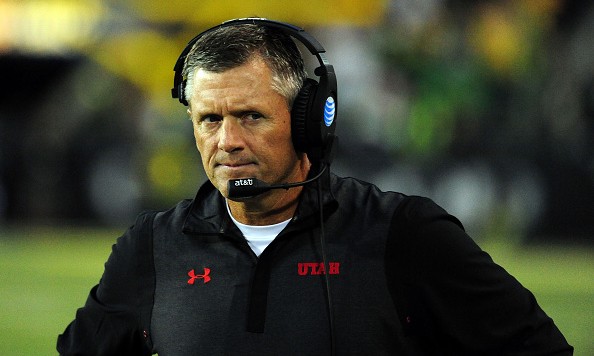Utah coach Kyle Whittingham had a lot to prove on Saturday.
Had this game been suspended or called after one quarter, Whittingham would have looked pretty good. As it is, though, teams have to play four full quarters. Yes, Utah still defeated archrival Brigham Young in the 2015 Las Vegas Bowl, but the way the game unfolded, a victory is the only thing Utah gained.
Whittingham proved his team could win 10 games in a season. His program could win consecutive Las Vegas Bowls.
Utah showed it is not a program in decline — give Whittingham and the Utes that much. However, Utah does not appear to be an ascendant program, and that’s a legitimate point of concern in Salt Lake City.
*
Yes, when you get a 35-0 lead in the first quarter as Utah did on Saturday in Sin City, one shouldn’t get too caught up in subsequent details as long as a victory is secured without too much drama.
Yet, that’s the point — Utah DID invite a lot of drama into Sam Boyd Stadium. The Utes had to convert a tension-laden third down in the final few minutes of regulation in order to avoid giving BYU the ball with a chance to tie the score (or win with a touchdown and a 2-point conversion). That Utah gave the appearance of fragility, even in victory, makes Saturday’s bowl championship feel more like survival than conquest.
Should the Utes feel satisfied about Saturday? Yes, they should. You either beat an archrival or lose to one, and Utah stood on the right side of the divide. However, if viewed in a context of the long-term health of the program, the lack of performance after the first quarter points to the stagnation which has marked Utah football in each of the last two Novembers and on a larger level relative to the season’s masterwork in 2008, when it finished in the top four of the BCS standings.
Utah can continue to depend on its defense as long as Kyle Whittingham is patrolling the sidelines near the Great Salt Lake. You saw on Saturday — and can tell in general — that on the defensive side of the ball, Whittingham gets it. He creates an aggressive, consistent, prepared defense which gets off blocks and generates a steady push into the offensive backfield. Utah does well on defense, and it also does well on special teams in terms of both punting and placekicking.
Yet, that very attention to detail on defense — the mark of good coaching — is so conspicuously absent on offense. That deficiency caused Utah to falter in key Pac-12 South games in November of 2014. It did the very same thing in November of 2015. It very nearly cost Utah a game on Saturday in which it led, 35-0.
Next year, Utah will have to turn to a less experienced and proven quarterback; even then, however, Travis Wilson was not a bastion of excellence. Competence? Yes. Excellence? Not even close. The Utes aren’t in decline, but they soon could be if Whittingham doesn’t find solutions on the offensive side of the ball.
It’s easy for Utah to revel in this win — the Utes shouldn’t exactly hold a funeral after beating BYU again — but the Utes face plenty of concerns next season, enough that their 35-28 triumph must be viewed with a certain degree of sobriety.
That refers to the winning team on Saturday.
*
BYU brought aboard Oregon State defensive coordinator Kalani Sitake as its new coach on Saturday, the same day Bronco Mendenhall coached his last game for the program before moving to the University of Virginia. Many BYU fans are happy with this hire, and they have reason to be. Sitake should definitely maintain and enhance the Polynesian recruiting pipeline LaVell Edwards established.
The question is, “Can he coach ’em up on gamedays?” We’ll find out in September, but in the meantime, the larger reality looms over BYU football: Can the program achieve to the extent that it gains more national recognition? Can it make the kinds of statements — in particularly white-hot spotlights — which will attract the attention of the Big 12? Sitake could become the man who is responsible for BYU either gaining College Football Playoff access (to a meaningful extent), or remaining locked outside the candy store.
An uneasy mix of hope and worry colors the landscape in Provo, and after seeing BYU get roasted in that first quarter on Saturday, that’s the easy part of the equation in the Beehive State, especially with the Cougars uncertain about their future relative to Power 5 conference access.
Yet, in many ways, the bigger story from Saturday is that a team with a 35-0 lead after one quarter entered an offseason with a not-entirely-optimistic tone… and fresh concerns about its ability to field an offense which can lead to a Pac-12 South championship and beyond in the years ahead.

